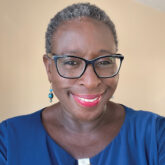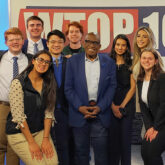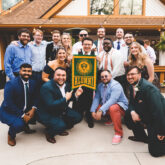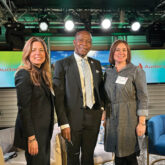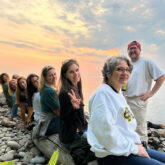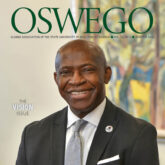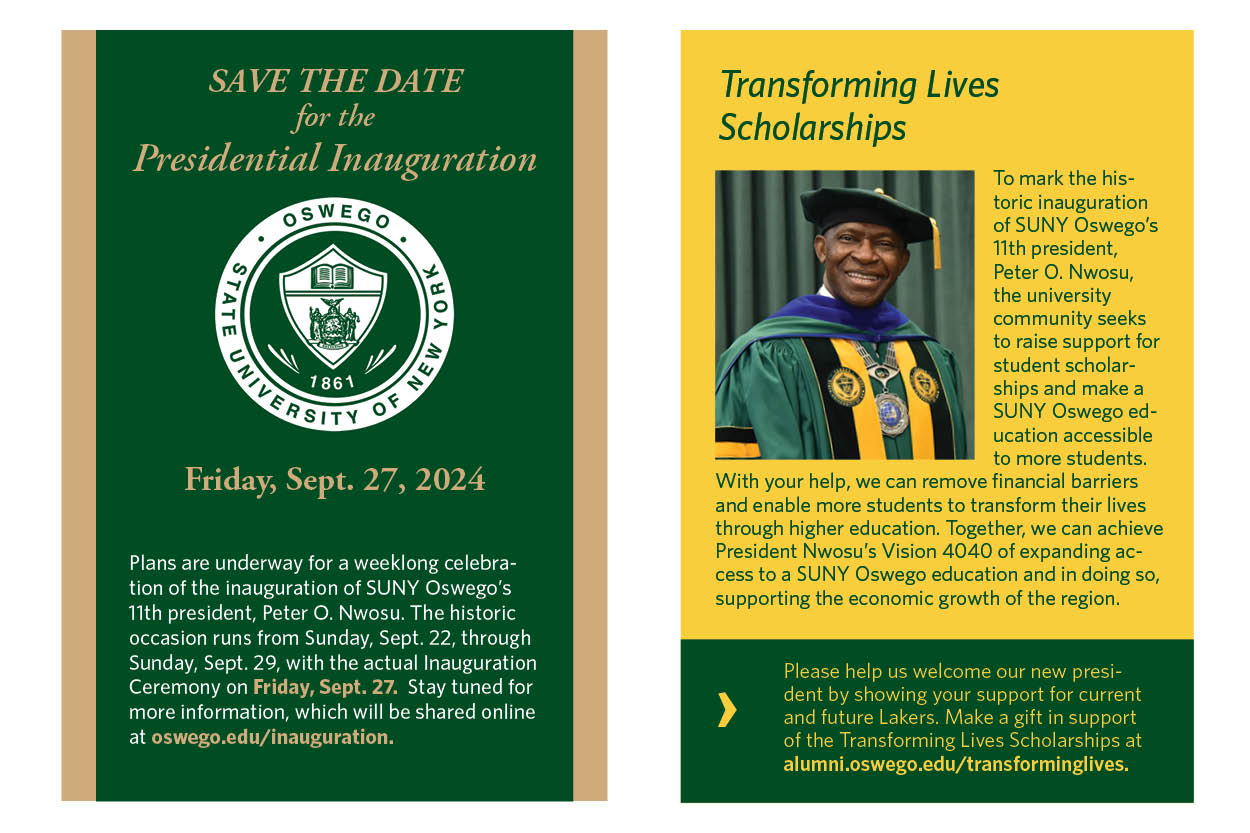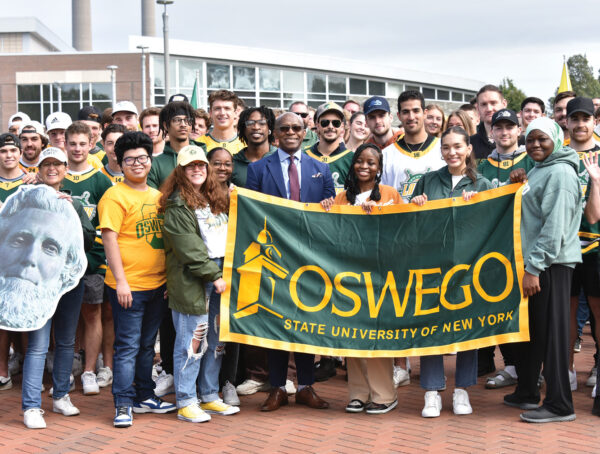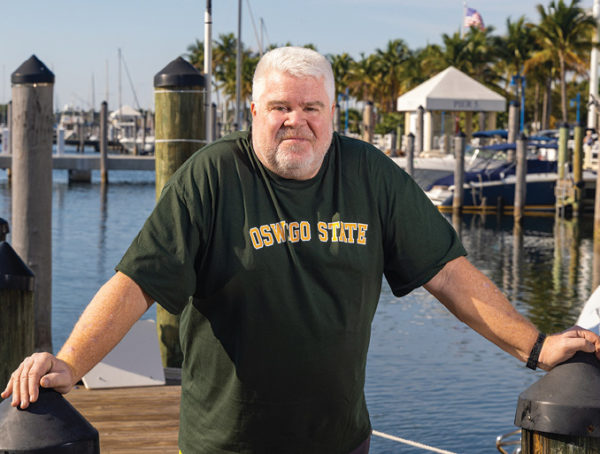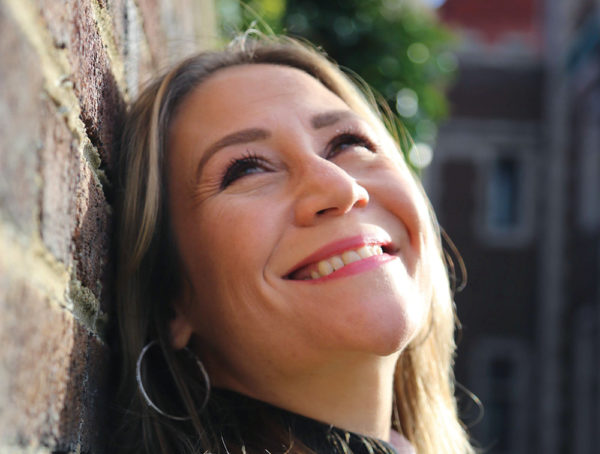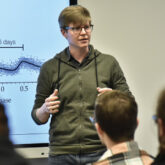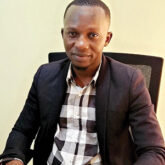VISION for the Future
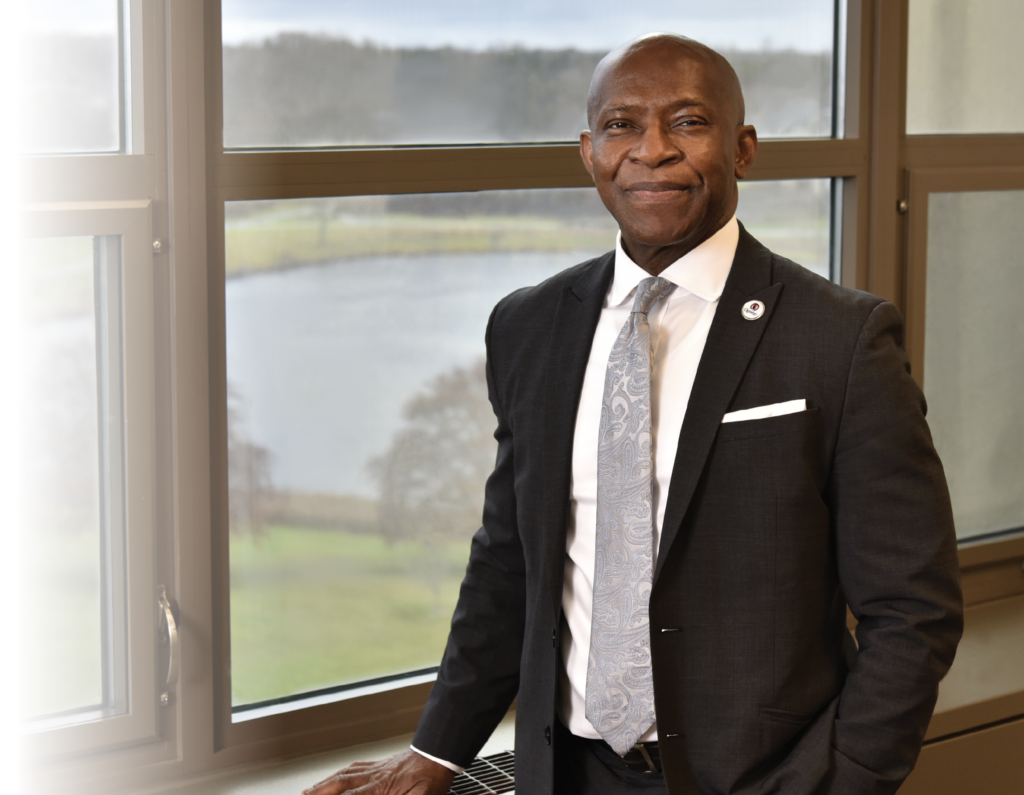
Peter O. Nwosu began his tenure as the 11th president of SUNY Oswego, building on the solid foundation laid by his predecessors to create opportunities and ignite possibilities for more Lakers
Peter Nwosu’s first encounter with snow was memorable on several fronts.
The native of Nigeria had heard descriptions of snow as being similar to the frost inside his freezer. But seeing it fall from the sky as a student at Towson University in Maryland in 1985 was quite a different experience.
Although the hour was late, he recalls running to a classmate’s room and knocking on his door to share his excitement.
“My classmate said, ‘What, what, what — why are you waking me up?’ I said, ‘Look! Look out your window.’ So, he looked out and said, ‘Oh, Peter, that’s snow.’ And he went back to sleep.”
The next day, Nwosu experienced a different quality of snow as he was walking down some outdoor steps.
“I was descending the stairwell with another classmate — Samuel Brown (who is a professor today) — and then I slipped and rolled down,” Nwosu recalled.
As Nwosu lay there at the bottom of the stairs, Brown scrambled down to him to ask if he was OK. It would be a memorable bump.
“I remember being there for a moment and all he could ask was, ‘Are you Ok? Are you OK?’” Nwosu said. “Finally when I got myself up, I said, ‘Why didn’t you say sorry?’ And he said, ‘What? I didn’t do anything.’”
Nwosu was puzzled by Brown’s reaction.
“In my culture, when a person falls down or hurts himself or herself, our reaction is to say, ‘Ndoo’ in my language,” Nwosu said. “It means ‘I’m sorry.’ It’s like saying you empathize. That’s how we show it. Now, notice how, whilst I have left Nigeria and I’m in the United States, Nigeria did not leave me yet. I was experiencing what we call a ‘cultural bump.’”
Nwosu was caught off guard by the “bump,” as he spoke English, was educated and thought he knew this new country.
The incident sparked his interest and he wanted to better understand these cultural bumps.
“It was the curiosity and the search — in science and research, we say the search for truth — that led me to apply to Howard University to study intercultural communication,” he said.
So, after completing a master’s degree in liberal studies at Towson University, he enrolled at Howard University, excelling in his coursework and expecting to return to Nigeria with his newfound knowledge of intercultural communications.
However, his presentation of his research paper at a national communication conference led to a job offer as a faculty member at California State University at Sacramento, and his education changed the course of his life’s trajectory.
That has been a theme for Nwosu: Education has been a driving force in his life’s narrative, and has taught him some invaluable lessons.

Nwosu credits his education as the force that presented new opportunities to him, and he often wonders where he would be today, if not for his education.
He was born one of nine children to his parents who were Igbos — a predominantly Christian people from northeastern Nigeria, which is home to more than 250 ethnic groups and equally as many languages. Of the nine siblings, only five — four boys and one girl — lived to adulthood.
Nwosu was born and raised in northern Nigeria, where a diverse mix of Christians and Muslims and a variety of ethnic groups lived.
“You grew up being respectful of differences,” he said. “It was pretty much a given.”
Although neither was college educated, his mom and his dad focused on the importance of education, and Nwosu thrived in the classroom throughout his schooling. He recalled being scolded by his father to turn off his light and go to sleep instead of reading, but his mother would step in and encourage the reading and learning.
“My parents, particularly my mother, valued education and wanted to make sure that we had that education,” he said. “It changes lives, opens doors. My parents also taught us lessons about humility, about respect. My mother made sure each of us knew how to cook, and we grew up learning to be kind to each other.”
He frequently read ahead in his academic books, so he could more fully engage in conversation with his teachers. Throughout his schooling, his classmates and even teachers gave him the nickname of “professor” because he could often explain the readings and assignments to his classmates as well as the teacher. He even recalls being asked privately to help grade his classmates’ assignments.
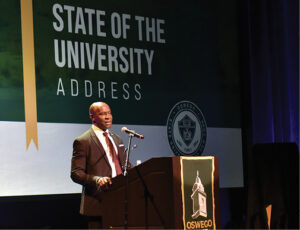
Look Ahead: On Sept. 28, 2023, President Nwosu delivered his inaugural State of the University Address and announced his Vision 4040, which outlines an ambitious plan for the future.
He took his education seriously, as he and his family saw it as a way to create new pathways in life.
One of his earliest memories was walking past bullet holes on the outside of his school — the result of the Biafra-Nigeria civil war (1967-1970) in which the Igbo peoples attempted to secede from Nigeria to create the Biafra Republic.
“My parents barely escaped,” he said. “As a toddler, I saw the horrors of war, and I have been very opposed to wars ever since. When the war ended, they fixed the inside of my elementary school in my little village. They left the outside bullet-ridden. The reason was, as traumatic as it was, they wanted us as young people to understand the horrors of war and traumas of war. We should always aim for peaceful dialogue to resolve issues, as opposed to picking up guns because the impact lasts forever. Violence begets violence.”
In addition to solidifying his beliefs as a pacifist, that early experience also informed his choice of research areas and careers — development through interpersonal communications and education.
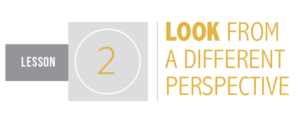
In his first academic position as a professor of communication studies at California State University at Sacramento, Nwosu brought lessons on cross-cultural communication to life in his classroom.
For example, he used the classroom’s individual chairs with desk arms to teach about cultural assumptions and privilege. One day he removed all the left-handed desk chairs, and asked his students if they noticed anything different about the classroom. None of the right-handed students noticed anything different, as the chairs looked and felt the same to them. Only the left-handed students recognized that there were no longer left-handed desk chairs available to them.
“For [the right-handed students], the privilege is almost invisible,” Nwosu writes in his book, Beyond Race: A New Vision of Community in America. “While they are aware that some of their classmates may be left-handed, that awareness is the extent of their knowledge. They are shocked then when their attention is drawn to the privilege they have enjoyed all this time.”
Bringing classroom lessons to life was very important to Nwosu.
He focused much of his time as a faculty member and a consultant to applying his knowledge and research on intercultural communications in professional and societal settings. He assisted several law enforcement agencies throughout California on managing differences and served on a task force established by then-Governor Gray Davis on addressing the disproportionate confinement of minority children in the juvenile justice system. He worked under the first African American Superior Court Justice, Alice Lytle, who was leading that effort, and his role was to enhance and advance issues of fairness and equity in the child welfare system.
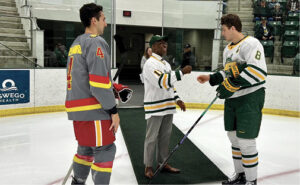
Look from a Different Perspective: Nigerian native President Nwosu took the ice for the ceremonial puck drop before the Lakers vs. King’s College (Pa.) men’s hockey game on Oct. 14.
“I loved what I was doing because I was making an impact,” Nwosu said. “And I was taking students and other faculty with me to help with this work. We were contributing, and we were doing the scholarship of application.”
During this period, he helped launch a bachelor’s and master’s program in intercultural and international communications at his university.
He also served for 10 years as editor of the peer-reviewed journal, Africa Media Review — the largest journal for communications on the continent.
“I had a colleague who was encouraging me to apply for more leadership roles within academia, but I was happy doing what I was doing,” Nwosu said. Although reluctant to apply initially, he found early success in his applications for administrative leadership roles.
But when he was selected to participate in the prestigious American Council on Education Fellows Program, a long-running academic leadership development program, the seed was more soundly planted in Nwosu that he could become a college president.
Again, education had opened another door to him.
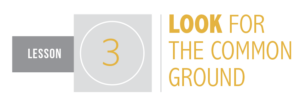
His first career came through Nigeria’s National Youth Service Corps (similar to AmeriCorps or the Peace Corps), in which every college graduate served one year following graduation. Nwosu worked with the World Bank’s Agricultural Development Project in public affairs, editing the newsletter called Ruralscope.
![Look for the Common Ground: “Part of what [the James A. Triandiflou Institute for Equity, Diversity, Inclusion and Transformative Practice] really stands for is the ability to educate us and inform us about what binds us all together,” President Nwosu shared during an Open House last fall.](https://magazine.oswego.edu/wp-content/uploads/2024/02/Pg21_20230928_Triandiflou_Institute_openhouse_0007-300x230.jpg)
Look for the Common Ground: “Part of what [the James A. Triandiflou Institute for Equity, Diversity, Inclusion and Transformative Practice] really stands for is the ability to educate us and inform us about what binds us all together,” President Nwosu shared during an Open House last fall.
That one-year position led to a full-time role as a public information officer and then as a senior public information officer. Part of his duties involved escorting journalists to one of the World Bank’s agricultural development projects underway in Nigeria at the time.
“I got to know the country very well,” he said. “I really enjoyed the work.”
He also met expatriates from a variety of countries, including India, Bangladesh, the United Kingdom and the United States. Those interactions nurtured his desire to study abroad and learn more about the role of communication in agricultural development. His connections from the World Bank projects helped him get his Visa to study at Towson University, and altered his course.
“I’m very interested in the relationship between culture and human communication,” he said. “That is also what informs the way I lead.”

During his presentations on the SUNY Oswego campus since the start of his tenure in August, President Nwosu has repeatedly shared the maxim: “If you want to go fast, you go alone. If you want to go far, you go together.”
President Nwosu wants SUNY Oswego to go far.
He believes that open dialogue and frequent communication are integral for the university’s success, and he immediately set out to establish those communication channels and develop that culture.
In his first 90 days as president, Nwosu met with hundreds of individuals representing internal and external groups, including local, regional, state and national entities. He played a leading role at numerous events during Founder’s Weekend in September, including hosting his inaugural State of the University Address where he announced Vision 4040, a bold plan to increase upward mobility and advance regional economic development (See related story).
He has packed his schedule with meetings, presentations and networking events to introduce himself and his vision to as many stakeholders as possible. He also takes the opportunity to collect their ideas and feedback to help guide the university’s future actions.
“President Nwosu has a deep appreciation for our founder, Edward Austin Sheldon, and the contributions of generations of alumni who have made this institution what it is today,” said Mary Gibbons Canale ’81, vice president for university advancement. “Our alumni have been excited to meet him and support his vision for the future of SUNY Oswego.”
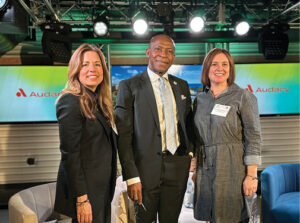
Look to Collaborate: President Nwosu partnered with alumnae Susan Applebaum Larkin ’85 and Dana Segall Murphy ’99, who co-hosted a presidential reception for alumni in November at their employer, Audacy, in Manhattan.
His collaborative approach, openness, eagerness and fast pace have grabbed the attention of other SUNY Oswego leaders.
“I find President Nwosu to be a very kind person,” said Provost and Vice President of Academic Affairs Scott Furlong. “He is a good communicator, and tells a convincing story regarding the need for growth that resonates with the community. He is always seeking to find improvements. He utilizes his people resources well.”
College Council Chair James McMahon said President Nwosu has hit the ground running at full speed.
“I’ve had campus members stop me and say, ‘Thank you for bringing him to us,’” said McMahon, who chaired the search committee and has served as chair of College Council for the past 15 years. “That really surprised me. He’s made such a positive impression in a short time. People are pleased. He has shared his vision, and he’s building consensus with all parts of campus and the community to move toward that goal.”
Faculty Assembly Chair and Professor of Economics Elizabeth Schmitt noted that President Nwosu has instituted some noticeable changes. For example, the meeting of the Budget Advisory Committee, which is made up of a representative group of campus members who meet in person, was live-streamed and the link shared out to the university community.
“He wanted to make sure that anyone who wanted to come listen and hear about things and and ask questions, would have the opportunity to do so,” said Schmitt, who also helped President Nwosu lead a town hall meeting for faculty and staff about the strategic planning process. “The town hall was something that he really wanted, as well. He’s very much about making sure everyone is informed and everyone has ample opportunity to participate.”

Schmitt said she has been most impressed by President Nwosu’s stamina and surprised by his delightful sense of humor.
Many in the campus community have said President Nwosu is a great fit for SUNY Oswego.
“What jumped out to me was how he lived this transformative educational experience,” Schmitt said. “His standard of living, his experiences, what he’s been able to accomplish for himself and other people goes back to education. Here’s someone who comes in and who’s first generation to higher ed, and he has seen the power of transformation. He seemed like a great choice to set up the design, operations and vision to continue that transformation for others. His vision aligns with SUNY Oswego’s mission and commitment to the common good.”
In addition to a stellar resume and progressive experience as a faculty member to leadership roles, his story and the way he communicates about education stand out as exceptional and aligned with SUNY Oswego’s mission.
“I’m really looking forward to working with him to inspire our alumni to support our students and strengthen their connections to their alma mater,” Canale said. “He has a pulse on the needs of our students and wants to do everything in his power to help them succeed.”
McMahon also said Nwosu fits seamlessly into the SUNY Oswego community.
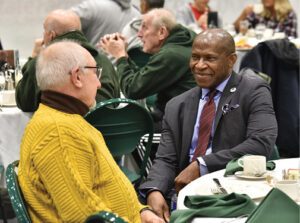
Look for Human Connection: President Nwosu personally greeted many of the attendees at the annual Campus Community Breakfast in December.
“What stands out to me is his experience as a first-generation student and his belief that the university transforms students into lifelong learners who leave the campus to do good in the world,” McMahon said. “He can relate to our students at all different levels. He’s smart and a quick learner, and he’s willing to look at everything to see how we can improve. He’s going to do
great things.”
Above all else, Nwosu’s kindness and warmth shines through in his interactions with others.
“Most of the candidates had very strong resumes and experience,” McMahon said. “He also has a good soul.”
Schmitt recalled joining SUNY Oswego in the mid-1990s and embracing the “friendly college by the lake” culture. From her seat beside him on stage, she watched President Nwosu during his first Commencement ceremony at SUNY Oswego in December.
“He’s just loving the day,” she said. “I was thinking about how many of these students are first generation and you can hear their families screaming in the background. And there he is, shaking their hands, and looking them in the eye and saying, ‘I’m so proud of you for what you’ve accomplished.’ And I’m thinking that’s probably something they’re never going to forget.
“So, we think of ourselves as a friendly institution where people matter, where we work together and not competitively to try to advance our mission,” she said. “His warmth has really fit into that vision as well with all kinds of different groups.”
You might also like
More from Featured Content
A Vision of Support
A VISION of Support Award-winning principal makes an impact on her school through her positivity and commitment When Nicole Knapp Ey ’02 …
Changing Climate
Coral reef scientist seeks to protect and restore marine ecosystems Perhaps it was the 100 inches of snow that fell in …

